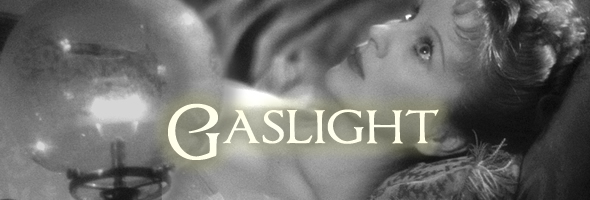
B&W, 1940, 84m.
Directed by Thorold Dickinson
Starring Anton Walbrook, Diana Wynyard, Frank Pettingell, Cathleen Cordell, Robert Newton
BFI (Blu-ray & DVD) (UK RB/R2 HD/PAL)
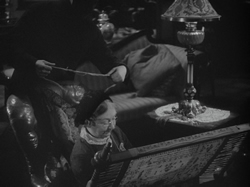 One of the major theatrical sensations of the late '30s both in American and the United Kingdom was
One of the major theatrical sensations of the late '30s both in American and the United Kingdom was 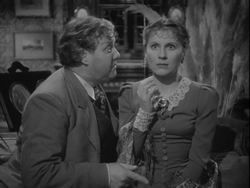 Gaslight, an psychological thriller by Patrick Hamilton (author of the play Rope and the novel Hangover Square, both turned into prominent films). When it went to Broadway with a cast including Leo G. Carroll, Judith Evelyn, and Vincent Price (the latter two seen together again in The Tingler), the title was changed to Angel Street; however, the original title was usually retained for both film versions, which opened within four years of each other.
Gaslight, an psychological thriller by Patrick Hamilton (author of the play Rope and the novel Hangover Square, both turned into prominent films). When it went to Broadway with a cast including Leo G. Carroll, Judith Evelyn, and Vincent Price (the latter two seen together again in The Tingler), the title was changed to Angel Street; however, the original title was usually retained for both film versions, which opened within four years of each other.
Released first in 1940, the British version of Gaslight was famously targeted for extinction by MGM to avoid competition with their own 1944 American production, which went on to earn an Oscar for star Ingrid Bergman. This wasn't an uncommon practice for the studio, who attempted a similar tactic with earlier competing versions of Dr. Jekyll and Mr. Hyde and Gigi. Fortunately the orders to destroy existing prints and the negative were unsuccessful, and the first version resurfaced on television and revival screenings in the 1980s, then becoming a fixture on Turner Classic Movies ever since. Film fans have enjoyed comparing and contrasting the two over the years, with the British one sticking much closer to the source play and running a taut 84 minutes versus the remake's nearly two-hour running time. In keeping with the romantic melodramatic tradition of Rebecca, the American edition embroiders the heroine's character with a far more developed and glamorous backstory, resulting in a far different feel from the streamlined original. Which one a viewer will 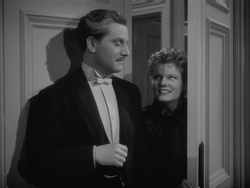 ultimately prefer is a matter of taste, but both are highly worthwhile with the British edition in particular deserving as much attention as its successor.
ultimately prefer is a matter of taste, but both are highly worthwhile with the British edition in particular deserving as much attention as its successor.
For the uninitiated, the story takes place in a bourgeois London home where an elderly woman is brutally strangled. Her famous rubies can't be found anywhere, and years later the same residence is inhabited by 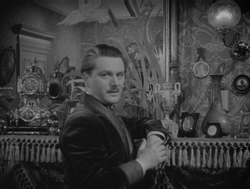 Bella Mallen (Cavalcade's Wynyard) and her overbearing husband, Paul (The Red Shoes' Walbrook). Bella is showing signs of intense strain and mental instability, including what her husband dismisses as hallucinations involving the gas lamps dimming at night and the sounds of footsteps through the walls. However, a retired police detective (Pettingell) believes Paul looks an awful lot like the murdered spinster's nephew, which might explain the boorish husband's suspicious behavior...
Bella Mallen (Cavalcade's Wynyard) and her overbearing husband, Paul (The Red Shoes' Walbrook). Bella is showing signs of intense strain and mental instability, including what her husband dismisses as hallucinations involving the gas lamps dimming at night and the sounds of footsteps through the walls. However, a retired police detective (Pettingell) believes Paul looks an awful lot like the murdered spinster's nephew, which might explain the boorish husband's suspicious behavior...
Most obviously, this Gaslight creates a dark, brooding atmosphere completely divorced from what you'd find in the Hollywood version, with a far more oppressive feeling of abuse and manipulation coming from Walbrook's chilling performance. Interestingly, both versions present Paul as a continental menace by using Austrian and French actors respectively (with Charles Boyer in the remake); he was a cold-hearted Brit on the stage, but apparently it was easier for film audiences to take a sadistic husband who hailed from abroad. Though it never quite topples into outright horror, this is definitely recommended viewing for thriller fans who like their twists on the nastier side.
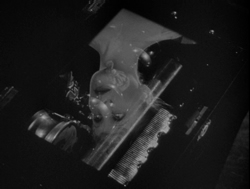 Briefly released on VHS in the UK, the 1940 Gaslight premiered on DVD from Warner in 2004, tucked away on the flipside of the 1944 version as a special feature. The transfer bearing the MGM logo was supposedly taken from the best materials available in the studio's vaults, which wasn't too encouraging considering how battered and soft it looked for the most part. Other transfers of significantly inferior quality also appeared from a variety of public domain outfits and are best avoided entirely.
Briefly released on VHS in the UK, the 1940 Gaslight premiered on DVD from Warner in 2004, tucked away on the flipside of the 1944 version as a special feature. The transfer bearing the MGM logo was supposedly taken from the best materials available in the studio's vaults, which wasn't too encouraging considering how battered and soft it looked for the most part. Other transfers of significantly inferior quality also appeared from a variety of public domain outfits and are best avoided entirely.
In a surprising turn of events, this once-neglected suspenser managed to hit Blu-ray before its more famous counterpart thanks to a restoration from the BFI, whose dual-format Blu-ray and DVD package was released in 2013 as part of their extensive gothic festival. The quality is light years beyond anything we've had before, looking absolutely pristine and featuring far more detail than before. It's far easier to appreciate the delicate, sometimes expressionist touches here courtesy of director Thorold Dickinson, who went on to helm the underrated horror/fantasy classic The Queen of Spades. The audio is also much sharper and easier to enjoy here, with optional English subtitles to boot. A hefty batch of extras are also included, all related in one way or another to Dickinson: "Spanish A B C," an 1938 educational short (20 mins.) co-directed with Sidney Cole about efforts to school the local population affected by the Spanish Civil War; the similarly themed "Behind the Spanish Lines" (20 mins.) from the same year about daily life for the citizens; "Westward Ho!" (1940), a 9-minute look at the relocation of British children to safer housing in the countryside to avoid World War II bombings; "Miss Grant Goes to the Door," a 7-minute 1940 narrative short directed by Brian Desmond Hurst (from a Dickson story) that actually plays like a precursor to Red Dawn, except with Nazis; and the 9-minute "Yesterday Is Over Your Shoulder" from the same year, about government-sponsored work training programs for engineers. The DVD also includes a PDF of BFI documents and materials connected to the main feature and Dickinson's career, while the liner notes booklet includes an in-depth Henry K. Miller essay about the main film (including coverage of intended director Anthony Asquith and the social concerns of the time woven into its seemingly escapist Victorian thrills). Additional essays include pieces by Iain Sinclair (about Patrick Hamilton's bumpy treatment in the cinema), talent bios, and additional notes on all of the shorts. Watch it with the lights turned down low and enjoy.
Reviewed on November 15, 2013.


 One of the major theatrical sensations of the late '30s both in American and the United Kingdom was
One of the major theatrical sensations of the late '30s both in American and the United Kingdom was  Gaslight, an psychological thriller by Patrick Hamilton (author of the play Rope and the novel Hangover Square, both turned into prominent films). When it went to Broadway with a cast including Leo G. Carroll, Judith Evelyn, and Vincent Price (the latter two seen together again in The Tingler), the title was changed to Angel Street; however, the original title was usually retained for both film versions, which opened within four years of each other.
Gaslight, an psychological thriller by Patrick Hamilton (author of the play Rope and the novel Hangover Square, both turned into prominent films). When it went to Broadway with a cast including Leo G. Carroll, Judith Evelyn, and Vincent Price (the latter two seen together again in The Tingler), the title was changed to Angel Street; however, the original title was usually retained for both film versions, which opened within four years of each other.  ultimately prefer is a matter of taste, but both are highly worthwhile with the British edition in particular deserving as much attention as its successor.
ultimately prefer is a matter of taste, but both are highly worthwhile with the British edition in particular deserving as much attention as its successor.  Bella Mallen (Cavalcade's Wynyard) and her overbearing husband, Paul (The Red Shoes' Walbrook). Bella is showing signs of intense strain and mental instability, including what her husband dismisses as hallucinations involving the gas lamps dimming at night and the sounds of footsteps through the walls. However, a retired police detective (Pettingell) believes Paul looks an awful lot like the murdered spinster's nephew, which might explain the boorish husband's suspicious behavior...
Bella Mallen (Cavalcade's Wynyard) and her overbearing husband, Paul (The Red Shoes' Walbrook). Bella is showing signs of intense strain and mental instability, including what her husband dismisses as hallucinations involving the gas lamps dimming at night and the sounds of footsteps through the walls. However, a retired police detective (Pettingell) believes Paul looks an awful lot like the murdered spinster's nephew, which might explain the boorish husband's suspicious behavior...  Briefly released on VHS in the UK, the 1940 Gaslight premiered on DVD from Warner in 2004, tucked away on the flipside of the 1944 version as a special feature. The transfer bearing the MGM logo was supposedly taken from the best materials available in the studio's vaults, which wasn't too encouraging considering how battered and soft it looked for the most part. Other transfers of significantly inferior quality also appeared from a variety of public domain outfits and are best avoided entirely.
Briefly released on VHS in the UK, the 1940 Gaslight premiered on DVD from Warner in 2004, tucked away on the flipside of the 1944 version as a special feature. The transfer bearing the MGM logo was supposedly taken from the best materials available in the studio's vaults, which wasn't too encouraging considering how battered and soft it looked for the most part. Other transfers of significantly inferior quality also appeared from a variety of public domain outfits and are best avoided entirely.